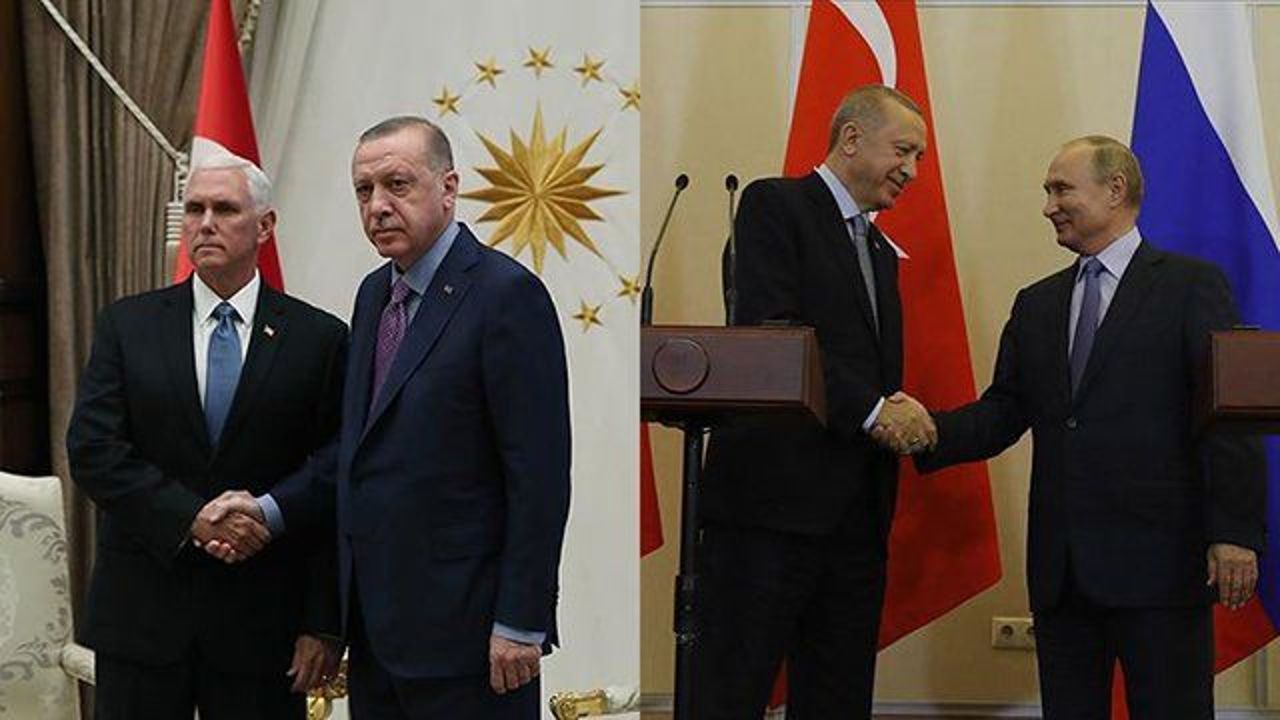Highlights of two major deals Operation Peace Spring achieves
Turkey’s agreements with Russia and US reaffirmed Turkey’s security concerns

Turkey has struck two major deals with Russia and the U.S. for a long-planned safe zone in northern Syria, a critical development which is expected to change the dynamics of the Syrian crisis in favor of millions of displaced Syrian refugees.
Both Russia and the U.S. reaffirmed Turkey’s legitimate security concern and its fight against terrorist organizations.
The tension on Turkey-Syria border reached a peak on Tuesday night when Turkey’s 120-hour pause of its anti-terror operation in northern Syria, which is one of the most important clauses of agreement with the U.S., expired.
On Oct. 17, a U.S. delegation led by Vice President Mike Pence paid a working visit to the Turkish capital, Ankara, where they met with President Recep Tayyip Erdogan and discussed Turkey's anti-terror operation.
Following the meeting, the two sides reached a 13-point agreement on northeastern Syria. As part of the deal, Turkey paused its anti-terror push east of the Euphrates for 120 hours to allow the withdrawal of the terrorist PKK and its Syrian offshoot the YPG/PKK from the planned safe zone. The pause ended on Tuesday night.
Just hours before the pause was set to expire, Turkey reached another "historic" deal with Moscow to enlarge the safe zone. Erdogan and his counterpart Vladimir Putin met in the Russian coastal city of Sochi to discuss Turkey's Operation Peace Spring, which was launched on Oct. 9, to eliminate terrorists from northern Syria in order to secure Turkey's borders, aid in the safe return of Syrian refugees and ensure Syria's territorial integrity.
Ankara and Moscow reached a 10-point deal under which YPG/PKK terrorists would pull back 30 kilometers (18.6 miles) south of Turkey’s border within 150 hours and security forces from Turkey and Russia would start to conduct joint patrols.
The 150-hour period, during which the Russian military police and the Syrian border guards will enter the Syrian side of the border outside the area of Operation Peace Spring to facilitate the removal of YPG/PKK terrorists and their weapons to a location 30 km (18.6 miles) from Turkey’s border in northern Syria, started at 12 noon (0900GMT).
Similarities between Turkey’s deal with US and Russia
Both Russia and the U.S. reaffirmed Turkey’s legitimate security concerns and its fight against terrorist organizations.
They also agreed on ensuring the political unity and territorial integrity of Syria.
Both sides referred to the YPG/PKK terrorist organization and its weapons in the region
"All YPG elements and their weapons will be removed from Manbij and Tal Rifat," the agreement with Russia said.
Similarly, Turkey and the U.S. highlighted the importance of a safe zone "to include the re-collection of YPG heavy weapons and the disablement of their fortifications and all other fighting positions".
Russia and Turkey also agreed that the status quo in the current Operation Peace Spring area covering Tel Abyad and Ras al-Ayn with a depth of 32 km (20 miles) will be preserved.
Turkey and the U.S. earlier agreed on Turkey having 32 km (20 miles) of safe zone south of the Turkish border in Syria.
Both Russia and the U.S. emphasized their determination to combat terrorism in all forms and that the manifestations and counter-terrorism operations must target only terrorists and their equipment.
Regarding the humanitarian aspect of the issue and refugees in particular, both countries pledged to abide by human rights.
The U.S. highlighted its "pledge to uphold human life, human rights, and the protection of religious and ethnic communities".
Similarly, Russia called on the international community to "provide humanitarian assistance to all returning Syrians without discrimination, politicization and preconditions".
Both countries made a commitment to implement all the goals stated in the agreements.
Different aspects of the deals
Stressing the importance of the Adana agreement, Russia will facilitate the implementation of the Adana Agreement in the current circumstances.
Turkey said its fight against terrorism in Syria is based on the Adana Agreement signed between the two countries in 1998, which allows Turkish forces to conduct military operations in Syrian territory.
Regarding the Daesh detainees in the region, both Turkey and the U.S. will coordinate on detention facilities and internally displaced persons from formerly Daesh-controlled areas, as appropriate.
Daesh elements were not a part of Turkey’s deal with Russia.
Turkey will take over the custody of Daesh elements and their family members being held in detention facilities and camps in areas to be freed from terror by Operation Peace Spring, according to the Turkish Foreign Ministry on Oct. 12.
Operation Peace Spring
As part of Operation Peace Spring, 160 settlements and 2,200 square kilometers (849 square miles) area has been taken under control and 775 terrorists have been neutralized, according to the Turkish Foreign Ministry.
Turkish authorities often use the word “neutralized" to imply the terrorists in question surrendered or were killed or captured.
In its more than 30-year terror campaign against Turkey, the PKK -- listed as a terrorist organization by Turkey, the U.S. and the European Union -- has been responsible for deaths of 40,000 people, including women, children and infants.
At least seven Turkish soldiers and 93 Syrian National Army (SNA) soldiers have been martyred and 357 SNA soldiers were injured since Turkey launched Operation Peace Spring.
Despite the deal with the U.S., YPG/PKK terrorists shot 42 harassing fires in northern Syria, according to the Turkish Defense Ministry.
So far 136 vehicles have left the region and a total of 40 mines and 222 handmade explosives have been defused.
On Oct. 7, U.S. President Donald Trump announced that it would pull back its forces from the Syrian border after a telephone call with Erdogan.
Frustrated over the U.S. withdrawal, some YPG/PKK supporters protested the U.S. troops by throwing rotten vegetables.







